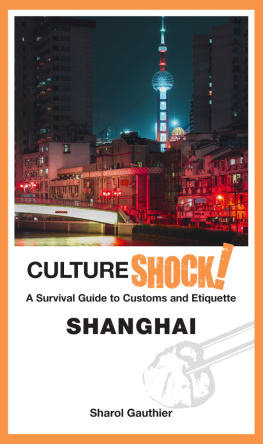
This edition published in 2008, reprinted 2013 by:
Marshall Cavendish Corporation
99 White Plains Road
Tarrytown, NY 10591-9001
www.marshallcavendish.us
1991 Times Editions Pte Ltd
2002 Times Media Private Limited
2005, 2008 Marshall Cavendish International (Asia) Private Limited
All rights reserved
No part of this publication may be reproduced, stored in a retrieval system or transmitted, in any form or by any means, electronic, mechanical, photocopying, recording or otherwise, without the prior permission of the copyright owner. Request for permission should be addressed to the Publisher, Marshall Cavendish International (Asia) Private Limited, 1 New Industrial Road, Singapore 536196. Tel: (65) 6213 9300, fax: (65) 6285 4871. E-mail:
The publisher makes no representation or warranties with respect to the contents of this book, and specifically disclaims any implied warranties or merchantability or fitness for any particular purpose, and shall in no event be liable for any loss of profit or any other commercial damage, including but not limited to special, incidental, consequential, or other damages.
Other Marshall Cavendish Offices:
Marshall Cavendish International (Asia) Private Limited. 1 New Industrial Road, Singapore 536196  Marshall Cavendish International (Thailand) Co Ltd. 253 Asoke, 12th Flr, Sukhumvit 21 Road, Klongtoey Nua, Wattana, Bangkok 10110, Thailand
Marshall Cavendish International (Thailand) Co Ltd. 253 Asoke, 12th Flr, Sukhumvit 21 Road, Klongtoey Nua, Wattana, Bangkok 10110, Thailand  Marshall Cavendish (Malaysia) Sdn Bhd, Times Subang, Lot 46, Subang Hi-Tech Industrial Park, Batu Tiga, 40000 Shah Alam, Selangor Darul Ehsan, Malaysia
Marshall Cavendish (Malaysia) Sdn Bhd, Times Subang, Lot 46, Subang Hi-Tech Industrial Park, Batu Tiga, 40000 Shah Alam, Selangor Darul Ehsan, Malaysia
Marshall Cavendish is a trademark of Times Publishing Limited
ISBN 10: 0-7614-5503-5
eISBN 13: 978 981 4435 71 0
Please contact the publisher for the Library of Congress catalog number
Printed in Singapore by Times Printers Pte Ltd
Photo Credits:
All black and white photos from the author except (Photolibrary). Colour photos from Getty Images pages de, h, jk, l-m, p; Photolibrary pages a, bc, fg, i, no  Cover photo: Photolibrary.
Cover photo: Photolibrary.
All illustrations by TRIGG
ABOUT THE SERIES
Culture shock is a state of disorientation that can come over anyone who has been thrust into unknown surroundings, away from ones comfort zone. CultureShock! is a series of trusted and reputed guides which has, for decades, been helping expatriates and long-term visitors to cushion the impact of culture shock whenever they move to a new country.
Written by people who have lived in the country and experienced culture shock themselves, the authors share all the information necessary for anyone to cope with these feelings of disorientation more effectively. The guides are written in a style that is easy to read and covers a range of topics that will arm readers with enough advice, hints and tips to make their lives as normal as possible again.
Each book is structured in the same manner. It begins with the first impressions that visitors will have of that city or country. To understand a culture, one must first understand the peoplewhere they came from, who they are, the values and traditions they live by, as well as their customs and etiquette. This is covered in the first half of the book.
Then on with the practical aspectshow to settle in with the greatest of ease. Authors walk readers through how to find accommodation, get the utilities and telecommunications up and running, enrol the children in school and keep in the pink of health. But thats not all. Once the essentials are out of the way, venture out and try the food, enjoy more of the culture and travel to other areas. Then be immersed in the language of the country before discovering more about the business side of things.
To round off, snippets of basic information are offered before readers are tested on customs and etiquette of the country. Useful words and phrases, a comprehensive resource guide and list of books for further research are also included for easy reference.
CONTENTS
Uncle Sam, Taxes, and You
FOREWORD
Foreign vacationers to the United States are likely to return home delighted by our country. The vastness and landscapes surpass expectation, the richness of ordinary homes seems astonishing, and above all, the friendliness of the people to strangers is unforgettable.
Culture shock is what happens when you stick around a little longer. It is the most naturaland elusiveof ailments. If one were to offer men the choice of all the customs in the world, they would examine the whole number and end up by preferring their own, wrote the Greek historian Herodotus almost 25 centuries ago, describing culture shock. But we rarely are insightful enough to realize that its cultural differences that separate us. We dont see our own ways of doing things as conditioned in the cradle. We see them as correct, and we conclude that the people from the other country have grave failings.
So our longer-term visitors start to complain: These Americans are always in a hurry; they are so materialistic; they arent sincere; the children are spoilt; they dont care about their families. The points vary according to country of origin. Brazilians find us work-crazed, Japanese think we are self-indulgent, Chinese think were selfish, British consider us unsophisticated, and Mexicans see us as greedy.
This book attempts to explain why we act the way we do, and in what ways our behavior is in accordance with our cultural values. Some of these values may seem questionable to you, but if you grasp what makes Americans tick, your stay herewhether long or shortwill be far more interesting, and your culture shock minimized. And perhaps you will be more forgiving of the aspects of American behavior that trouble you.
If you have come to stay for good, it is all the more important that you try to be sympathetic to American culture. In fact, you will do best to acquire some American qualities yourself if you want to succeed. Furthermore, you dont want to end up in one of those enclaves of foreigners which nourish themselves on disdain for Americawhile their children are becoming more and more American. (This is not the same thing as valuing your own customs and culture, a blameless idea.)
When in Rome, do as the Romans do is a useful adage for both immigrants and short-term visitors, but to follow it you must know what they do. We often unconsciously judge others by behavior that we arent even conscious of noticing. For instance, if you offer a limp handshake to an American while looking downwards, the American will not imagine that you are behaving very politely by your own rules; instead he will assume that you are uninterested in meeting him. If you know what American customs are, you will find your encounters with Americans both more fruitful and more frequent.
Americans are straightforward, and yes means yes and no means no. Our protocol is not strict, and in social situations, you neednt be overly concerned about correct behavior. If you eat with the wrong fork or wear blue jeans to a cocktail party, people are unlikely to be offended. There are few taboos, and little formality is expected of anyone.
However, although theres a lot of freedom, there are limits. After reading this book, you should a have good idea of where those limits lie. Meanwhile, smileas Americans constantly doask questions when youre puzzled and dont worry too much about behavior. In the end, an Indian friend said after enumerating her complaints about Americans, people are really more alike than different. If you learn the native customs and even come to understand the natives, you will go beyond the small differences and on to the big things that we all have in common.
Next page














 Marshall Cavendish International (Thailand) Co Ltd. 253 Asoke, 12th Flr, Sukhumvit 21 Road, Klongtoey Nua, Wattana, Bangkok 10110, Thailand
Marshall Cavendish International (Thailand) Co Ltd. 253 Asoke, 12th Flr, Sukhumvit 21 Road, Klongtoey Nua, Wattana, Bangkok 10110, Thailand